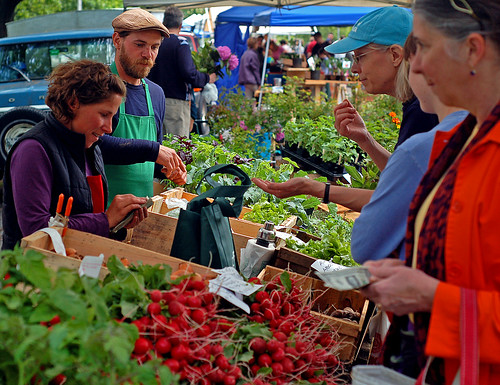 I was reading a post on Facebook the other day with regard to farmers markets and one commenter wrote that every town needed one and that her city did not.
I was reading a post on Facebook the other day with regard to farmers markets and one commenter wrote that every town needed one and that her city did not.
On the face of it, that sounds like something out of a ‘say wha?” sort of experience. Doesn’t every place have a farmers market? Someplace?
No. Actually, not. And it’s not like one of those Mickey Rooney/Judy Garland pictures from the 30s where all the kids get together and gosh-darn, come up with the idea of putting on a show to raise money (for, choose one, the school, the town hall, some poor kid who needs to go to the hospital). It’s one thing for a single producer to pull a truck off the side of the road, put up signs in both directions and set up a display of tomatoes and melons. It’s an entirely different thing to develop a farmers market. And even if all the ‘i’s” are dotted, the paperwork is all filed correctly, etc. etc., the farmer’s market might still not succeed.
Here are a few items that are really and truly necessary to have a farmers market (success is another deal):
— A group of producers who are already growing what the local customers would buy AND who are not already over-drawn on other farmers markets in the reasonably close area. If your community doesn’t have one and the neighboring counties DO, there’s a reason for that. It might be that no producers in your county have the time to commit to a farmers market. Or, they might not be in the ‘direct to the consumer’ part of agriculture. Or, they might all be growing commodity items like soybeans, wheat, feedstocks. Or, they might already be going to the other farmers markets and do not have a family member or friendly person who will come out to the farm, pick up the freshly picked produce or the eggs or the dressed chickens or whatever it is, first thing on market day. Nor go to the market location, set up the canopy and the tables and the ice chests or whatever. Nor stay there for the whole market, promote the products, sell, make change, take customer names and emails, and the thousand other things that the individual vendor must do in order to make sure the customers come back next week. Participating in a farmers market takes a lot of person hours. Hours that are taken away from ..oh yes, the farm. For many producers, having a farm stand right at the end of their drive looks like a far better deal. So, question one is: Are there actual farmers (not folks who will go to the wholesalers and buy up yesterday’s green peppers and try to pawn them off as home grown) who are not already committed to a farmers market AND are interested?
— What does the ‘area need’ look like now? How close is the closest farmers market and how often does it operate? Once a week? Twice a week? Is it reachable by public transport? Who is the customer base? If you feel your community needs a farmers market or another farmers market, you have to look at that. We already had several farmers markets in our county at various times of the week, including one that operates downtown two days a week. However, the biggest market at that time operated all the way out at the western end of the county and due to location, had basically no parking and a vendor waiting list that was several years long. So we had access issues and we had vendors who were being shut out. The local cooperative extension was able to make the case that the area could use another farmers market, in an area more accessible, with more parking, and with public transport, one day a week, in a county park. This is now the largest farmers market in the county.
— Do you have an agency or organization that is willing to sponsor a market? This is mostly for organizational and physical location issues. Our local city economic development agency sponsors the downtown markets – they made arrangements to get the street shut to traffic; the park one is sponsored by the county parks department, the county cooperative extension, with an assist from the county public transport, which schedules bus runs into the park, right by the market, on market day. The agency or organization will also need to help the vendors organize themselves into a market group, write bylaws, set fees, define roles and so on. If vendors want to sell processed foods, such as baked goods, jams, jellies, salsa, etc. etc., depending on your state’s Health Department or Agriculture Department rules, the sponsors need to work with those state and local departments in order to get vendors certified, inspected if need be and so on. Again, this is not a Mickey and Judy “Let’s put on a show”.
— Is there a location with visibility and access? Our downtown farmers market has been moved several times over the years and every time it changed location, they lost vendors and customers. They finally moved it in a permanent sort of way several years ago and did lot of promotion and activities on market day to attract people from the 6 square block area. They put the market right next to the court house, on a non-busy little street, which basically was within a two block walk of all the major downtown employers. So, they concentrated the customer base. The county park market has a number of benefits: It’s in an open parking lot that is seen directly from the interstate. There is an exit and entrance right off the interstate right there. There is signage outside the park and inside the park advertising the market and the market developers do a fair amount of ‘activities-based’ promotion to get families to come to the market (bike helmet checks and giveaways, car seat checks, free cookbooks, and so on). The vendors at the park market love that location.
— Is there someone who is willing to put in all the work, usually as a volunteer (unless the sponsoring organization makes it part of that person’s job), to organize the market, collect fees, pay bills, police the situation, act as the face of the market, be the interface between the market, the vendors and state and local agencies and organize and put into play promotional activities, PR and so on? This is a huge issue for markets because vendors want their money to go into activities which put money into their pockets. They really would rather not have to pay for a market manager. Only in large cities or where the market is a ‘destination’ situation where vendors can charge premium prices for their goods and produce, do you find paid market managers. Being a volunteer market manager is a labor of love and burn out is a huge issue. If the market is on weekends, the manager not only has to do work during the week on the market but also has to be there for the market as well. There is a lot of turnover in market managers.
So, let’s say you feel your community could use a farmers market? My best suggestion at that point is to approach your county cooperative extension and ask to speak to the agricultural economic development specialist to talk about it.
(photo of farmers market courtesy of Corey Templeton)

I am so grateful for my farmer’s market. Baltimore is considered a food desert with a lack of grocery stores. I even joined a CSA to support local growers.
The thing I love about the farmers market is that I can look the person behind the table in the eye and ask what they are doing; how they are raising; what they are spraying (if at all). To me, this is huge. The making friends with them, etc. is icing on the cake.